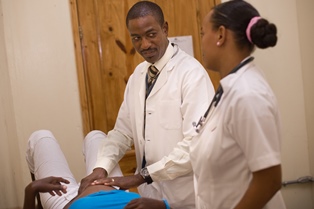Students of the graduate diploma program in the management of HIV infection have the opportunity to receive instruction from a hand-selected group of experts. Photo courtesy of Ben Depp.
In the Caribbean, an estimated 250,000 people are living with HIV (UNAIDS, 2013). To address this epidemic, health workers must have the latest information to guide the treatment and care of those living with HIV and AIDS. The University of the West Indies (UWI) St. Augustine campus in Trinidad and Tobago offers a one-year graduate diploma program in the management of HIV infection.
In partnership with UWI and the Caribbean HIVAIDS Regional Training Network (CHART), the International Training and Education Center for Health (I-TECH) and University of Washington Department of Global Health’s eLearning Program (eDGH) helped to transition the program to a blended learning platform — one that offers courses online as well as an in-person practicum.
Support for this transition was provided by the U.S. President’s Emergency Plan for AIDS Relief (PEPFAR) through the Department of Health and Human Services’ Health Resources and Services Administration (HRSA).
The program recently completed its first semester in this new format. With the expanded platform, students have the flexibility to access the course material “anytime and anywhere,” says Professor Zulaika Ali, Program Coordinator, “and it allows students to organize their training around their routine activities, which is important for mature working individuals.”
The conversion of courses online creates a one-of-a-kind program in the Caribbean, increasing access for mid-career health professionals working in the public sector, for non-governmental organizations (NGOs), and for commercial organizations. The program was designed for medical doctors, pharmacists and dentists, as well as nurses with bachelor degrees from any recognized university; registered nurses with a minimum of three years of experience; social workers; management staff from government ministries, private sector and NGOs; and tutors and lecturers in training institutions.
After a week-long online student orientation, students explore the following topics through online instruction and relevant resources, synchronous virtual classroom sessions, and collaborative activities and discussions. At the end of each semester, students complete an in-person exam. After completion of the online courses, students participate in an in-person practicum or dissertation. Courses include:
- Research Methods and Design
- HIV Epidemiology and Pathogenesis
- Laboratory Techniques for Diagnosis of HIV
- General Management of HIV/AIDS
- HIV Co-Infection and Other Related Issues
- HIV Health Systems
- Sexual and Reproductive Health
In addition to the flexibility this part-time program offers, students also have the opportunity to receive instruction from a hand-selected group of experts from around the globe, including professors, health care workers from the Ministry of Health and NGOs, and professionals practicing in the region.
Transition from in-person to blended learning
In late 2013, I-TECH and eDGH were approached by UWI to convert the in-person diploma program into its second, blended rendition. The team started by piloting two courses online in the Moodle learning management system (LMS). From there, they obtained critical feedback for the remainder of the conversion.
Their research showed that students felt the course content was clear, appropriate, interesting, and applicable to their work and reported a preference for recorded lectures and relevant videos, anytime/anywhere access, and interactions with instructors and peers. Likewise, faculty enjoyed building new skills through online instruction.
“We conducted two in person, on-site faculty workshops, countless Skype calls, online trainings, and emails to build the capacity of faculty to develop and teach online,” says Elizabeth Scott, Senior E-Learning Developer with eDGH. “Working with faculty was a highly rewarding experience. They were motivated and dedicated, and they worked tirelessly side-by-side with us to create the best possible experience for students.”
As part of the project, the I-TECH/eDGH team also developed a commercial for the program (see below), as well as a number of introductory materials that can be used for a variety of online and blended learning programs. Among them are a general student orientation to help learners identify skills and characteristics necessary for success in online courses and an e-learning basics module for instructors.
“The informational materials developed for the program will help to improve the delivery of health care more generally,” says Dr. Ali.
A robust transition guidebook was also assembled, containing roles and expectations, best practices, online orientation materials, processes, budgeting templates, evaluation tools, job aids, and tasks and timelines for faculty and staff for ease of handover from year to year.
“The delivery of this program in the blended format will have a tremendous impact on the quality of care delivered to people infected with and affected by HIV,” says Dr. Ali. “The Faculty of Medical Sciences looks forward to welcoming regional and international students into the program. This new platform will surely enrich the learning experience of all involved.”
